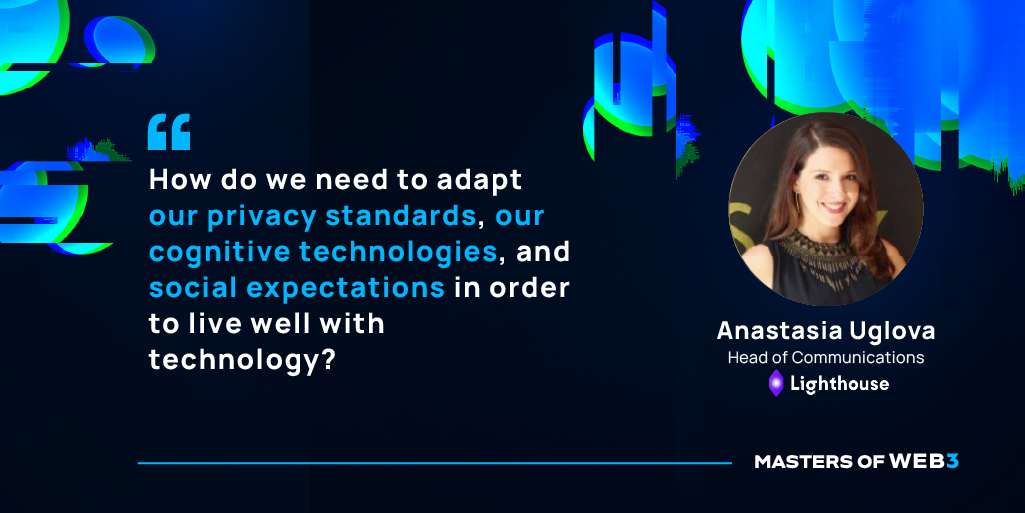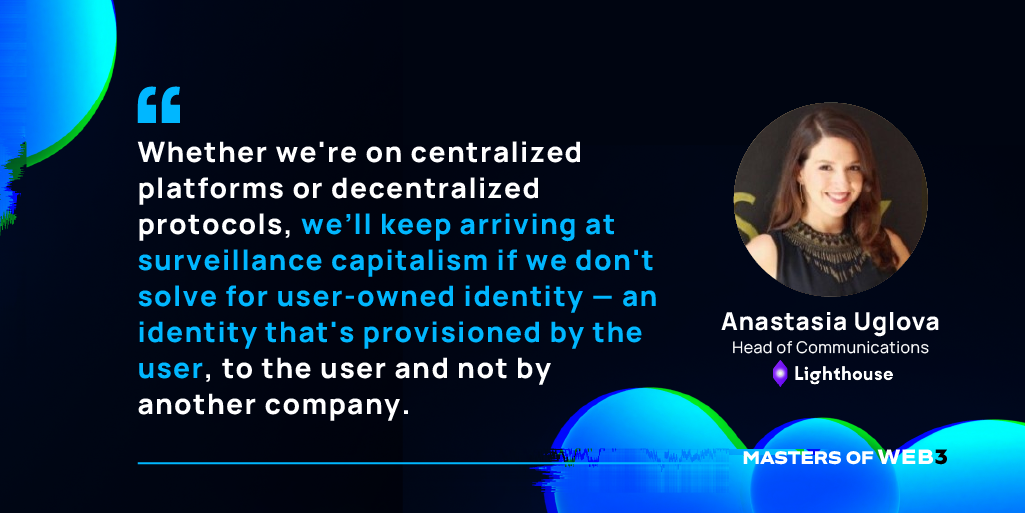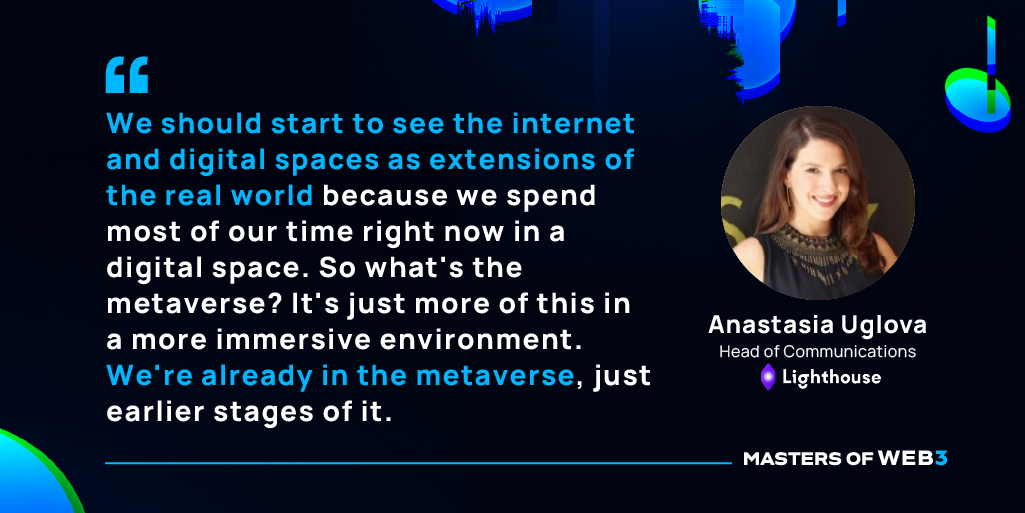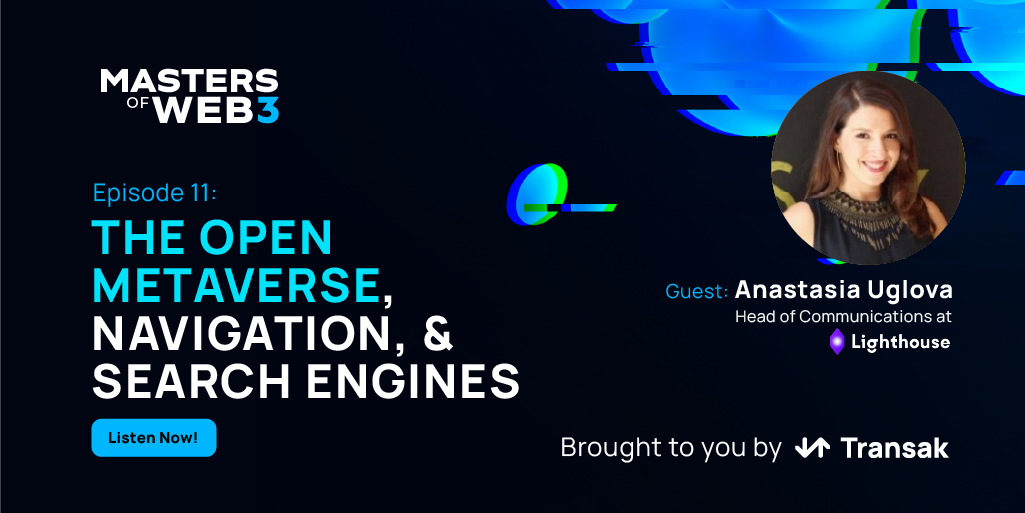After witnessing political volatility and moving to the U.S. from Moscow in the early 1990s, Anastasia decided as a child that she wanted to create world change through technology.
That led to an undergraduate degree in political science, a varied career in media, and six years in Rwanda bringing education and tech to East African citizens.
Then the Cambridge Analytica data scandal happened, and Anastasia knew she wanted to move into the crucially important digital privacy field.
Anastasia Uglova is the Head of Communications & Ecosystem Development at Lighthouse, an alumna of Cornell with a Masters in InfoSec from UT Austin and an experienced skydiver.
Join us as we discuss:
- How do we preserve digital privacy and consent in increasingly immersive spaces?
- Preserving your identity in the metaverse — and the role crypto tech plays
- Why technology evolves faster than our cognitive adaptability
- Dark pattern design and taking control of your user journey
Preserving digital privacy and consent in increasingly immersive spaces
With technology becoming more and more advanced by the minute, adapting to these changes has become an ongoing challenge. Now, you can track everything in your life from your sleep to your finances.
Because of this, privacy has become a considerable concern. Much of our data is put at risk every day because of how closely our technology usage is tracked and with new networks such as the metaverse becoming more mainstream, we are more immersed in the digital world than ever before.

“How do we need to adapt our privacy standards, our cognitive technologies, and social expectations in order to live well with technology?” - Anastasia Uglova
'
At Lighthouse, Anastasia is working towards making the spatial web a safer place for its users. Lighthouse is a navigation engine for the metaverses and privacy is at the top of its priorities. By hosting this search engine on web3, Anastasia is hopeful that users will be able to consent to how much of their information is searchable and viewable by other users.
But this is not a one-person job.
How crypto tech helps preserve your metaverse identity
While studying information security at the University of Texas at Austin, Anastasia decided to do her thesis on the web3 publishing platform, Mirror. During her studies, she came face to face with a lot of findings when it came to metaverse identity preservation.
A big challenge she faced was figuring out how to solve consumer privacy when it came to one’s decentralized identity.

“Whether we're on centralized platforms or decentralized protocols, we’ll keep arriving at surveillance capitalism if we don't solve for user-owned identity — an identity that's provisioned by the user, to the user and not by another company.” - Anastasia Uglova
Just as websites and companies can track what ads you look at and what apps you spend the most time on, in the metaverse, one’s meta data tracks where in the metaverse you spend the most time, what sites you’re looking at and so on.
On top of this, users are expected to manage fragmented identities across thousands of applications and websites with various privacy agreements. If our identities on the web were determined by us and were able to be used universally via an identity token across all sites, privacy would be a lot more all-encompassing, Anastasia argues. The sites and apps that one joins would have to agree to the privacy terms that the user decides.
After coming to this realization, Anastasia knew just how important it was for people to understand identity in the crypto space and just how important it is to solve this issue.
Why technology evolves faster than our cognitive adaptability
There are innovations in technology seemingly every other hour. How do consumers keep up with all of this change? Anastasia claims that we can’t.
Most people do not study technology for a living but are expected to understand how things as specific as information security work.
Anastasia believes that it is in the hands of the developers of these products to create an environment that is conducive to pro-social goals that don’t undermine one’s consent in one’s agency. Making the web a more universal space — where one can have one set of preferences, one identity and one understanding of their experience on the web — is a future that would aid in the understanding of new technology.

“We should start to see the internet and digital spaces as extensions of the real world because we spend most of our time right now in a digital space. So what's the metaverse? It's just more of this in a more immersive environment. We're already in the metaverse, just earlier stages of it.” - Anastasia Uglova
Why technology evolves faster than our cognitive adaptability
Dark pattern design is a way for sites to get a user to agree to something they perhaps would not have otherwise agreed to. It’s a major way that sites are gaining more and more access to their user’s information.
Making the agreements a seamless click-through experience is incentivizing the user to consent to more agreements to have the most user-friendly experience possible. But this takes away the user’s right to choose.
Anastasia suggests that a solution to this is, again, decentralized identity. This puts the user in control of their web journey and information. No longer will the user be faced with hundreds of pop-ups and shiny green buttons that tell them to accept everything, instead users will have a decentralized “control panel” to let the web know exactly how they want their experience to go.
Want to learn more about the metaverse, how decentralized identity is essential to digital privacy and keeping up with the evolution of technology? Listen on Spotify, Apple Music or wherever you listen to podcasts.
Want to learn more about Lighthouse and how it's changing the mobile crypto space in a way that’s more than just financial? Listen on Spotify, Apple Music or wherever you find your podcasts.
Building in Web3 and looking to accept payments? Integrate Transak Today

